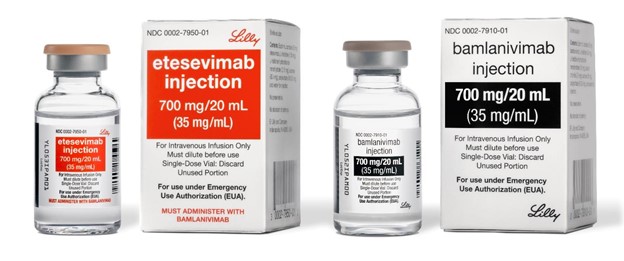After a two-month long halt, federal officials have given the go-ahead to resume nationwide distribution of Eli Lilly’s COVID-19 monoclonal antibodies bamlanivimab and etesevimab. The pause on the antibody combo was made over concerns of the drugs not being effective against new SARS-CoV-2 variants, back when they were first identified in Brazil and South Africa. However, new data shows that while those variants may be resistant to the drugs, the currently dominating Delta variant may not be.
The Office of the Assistant Secretary for Preparedness and Response (ASPR) at the US Department of Health and Human Services issued a notice late last week alerting of the resumption in use and distribution of bamlanivimab/etesevimab. The federal decision will see the return of the combo to over 20 states.
In the notice, they said that bamlanivimab and etesevimab can be administered together, “Based on FDA’s evaluation of the most recently available SARS-CoV-2 variant frequency data,” and that it can be used in all US states, territories and jurisdictions as per the conditions of authorization.
With the Delta variant becoming the dominant variant in the US and driving a fourth wave of COVID-19 infections, hospitalizations and deaths across the country, there were concerns that Lilly’s antibody combo wouldn’t hold up against the variant. However, studies now show the COVID-19 monoclonal antibodies can work against the variant. Federal officials also say variants that can evade the Lilly drug combo are decreasing in prevalence, making it a good time to allow its use.
According to data from the Centers for Disease Control and Prevention (CDC), the Delta variant (B.1.617.2) now makes up about 99 percent of sequenced COVID-19 cases in the US.
This is somewhat good news with respect to Lilly’s COVID-19 monoclonal antibodies, as it was appearing that the bamlanivimab/etesevimab antibody cocktail does not fare well against some of the earlier variants that originated in Brazil and South Africa (Gamma/P.1 and Beta/B.1.351, respectively).
On the other hand, in vitro studies show that the co-administration of bamlanivimab and etesevimab retains activity against the Delta variant, but not against Delta plus and some of the earlier variants. It’s important to note that the studies being cited are non-patient, lab studies; clinical data on the effectiveness of the drugs against Delta is awaited.
“The increase in prevalence of Delta has been associated with a decrease at the same time in the frequency of identified variants that are expected to be resistant to bamlanivimab and etesevimab,” the feds said.
A week prior to the latest alert, ASPR had informed of its decision to reauthorize use of the COVID-19 monoclonal antibodies with revisions, expressing concerns and guidance about variant resistance to the drugs. In it, it advised “use of bamlanivimab and etesevimab, administered together, only in states, territories, and US jurisdictions in which recent data shows the combined frequency of variants resistant to bamlanivimab and etesevimab administered together is less than or equal to .”
The halt on Lilly’s COVID-19 antibody combo allowed COVID-19 antibody rival Regeneron to gain significant ground on its Regen-Cov, consisting of a dual combo of casirivimab and imdevimab, which won another FDA authorization for post-exposure prevention recently. This has led the Regeneron antibodies to dominate the market as it raked in $2.6 billion in the second quarter. There has been high demand for the drug in states like Texas and Florida, which have been facing a summer surge of COVID-19.
While Lilly’s COVID-19 antibody program garnered more than $800 million in the last quarter of 2020 and the first quarter of 2021, the bamlanivimab/etesevimab pause caused the company’s COVID-19 antibodies sales to plummet to $149 million in the second quarter of this year.












Join or login to leave a comment
JOIN LOGIN